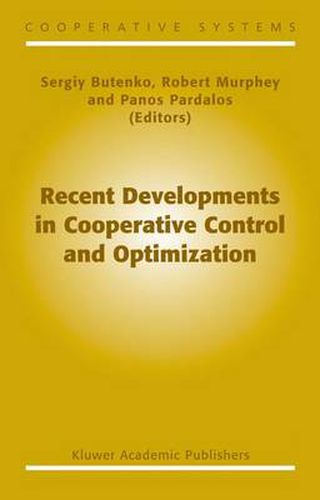Readings Newsletter
Become a Readings Member to make your shopping experience even easier.
Sign in or sign up for free!
You’re not far away from qualifying for FREE standard shipping within Australia
You’ve qualified for FREE standard shipping within Australia
The cart is loading…






This title is printed to order. This book may have been self-published. If so, we cannot guarantee the quality of the content. In the main most books will have gone through the editing process however some may not. We therefore suggest that you be aware of this before ordering this book. If in doubt check either the author or publisher’s details as we are unable to accept any returns unless they are faulty. Please contact us if you have any questions.
Over the past several years, cooperative control and optimization has un questionably been established as one of the most important areas of research in the military sciences. Even so, cooperative control and optimization tran scends the military in its scope -having become quite relevant to a broad class of systems with many exciting, commercial, applications. One reason for all the excitement is that research has been so incredibly diverse -spanning many scientific and engineering disciplines. This latest volume in the Cooperative Systems book series clearly illustrates this trend towards diversity and creative thought. And no wonder, cooperative systems are among the hardest systems control science has endeavored to study, hence creative approaches to model ing, analysis, and synthesis are a must! The definition of cooperation itself is a slippery issue. As you will see in this and previous volumes, cooperation has been cast into many different roles and therefore has assumed many diverse meanings. Perhaps the most we can say which unites these disparate concepts is that cooperation (1) requires more than one entity, (2) the entities must have some dynamic behavior that influences the decision space, (3) the entities share at least one common objective, and (4) entities are able to share information about themselves and their environment. Optimization and control have long been active fields of research in engi neering.
$9.00 standard shipping within Australia
FREE standard shipping within Australia for orders over $100.00
Express & International shipping calculated at checkout
This title is printed to order. This book may have been self-published. If so, we cannot guarantee the quality of the content. In the main most books will have gone through the editing process however some may not. We therefore suggest that you be aware of this before ordering this book. If in doubt check either the author or publisher’s details as we are unable to accept any returns unless they are faulty. Please contact us if you have any questions.
Over the past several years, cooperative control and optimization has un questionably been established as one of the most important areas of research in the military sciences. Even so, cooperative control and optimization tran scends the military in its scope -having become quite relevant to a broad class of systems with many exciting, commercial, applications. One reason for all the excitement is that research has been so incredibly diverse -spanning many scientific and engineering disciplines. This latest volume in the Cooperative Systems book series clearly illustrates this trend towards diversity and creative thought. And no wonder, cooperative systems are among the hardest systems control science has endeavored to study, hence creative approaches to model ing, analysis, and synthesis are a must! The definition of cooperation itself is a slippery issue. As you will see in this and previous volumes, cooperation has been cast into many different roles and therefore has assumed many diverse meanings. Perhaps the most we can say which unites these disparate concepts is that cooperation (1) requires more than one entity, (2) the entities must have some dynamic behavior that influences the decision space, (3) the entities share at least one common objective, and (4) entities are able to share information about themselves and their environment. Optimization and control have long been active fields of research in engi neering.